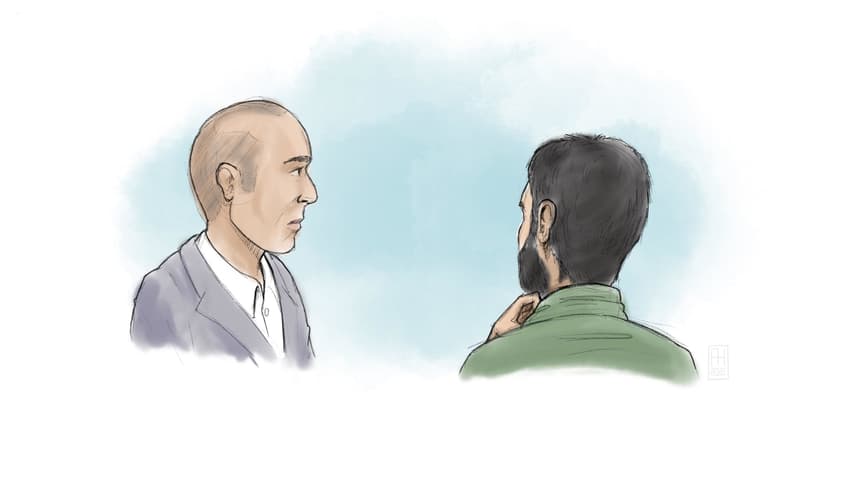Jailed Swedish spy admits selling information to the Russians

Peyman Kia, 42, the eldest of the two brothers jailed in January for spying for Russia's GRU intelligence service, has for the first time admitted to passing over information for money.
Kia had a long career in Swedish intelligence official, working for the security police, Säpo, as well as the Swedish Armed Forces and their military intelligence service, Must. He was sentenced to life in prison in January for what has been called Sweden's worst-ever spy scandal.
Throughout the court case last year, Kia and his brother claimed innocence, but now, in a new interview with Säpo, he has for the first time started to admit what he did.
"It was quite simply to earn money for myself," he told Säpo in an interview, according to the broadcaster TV4, although he played down the importance of the information he had passed over.
"I have never been in direct contact [with GRU], actually physically. On the first occasion it was real intelligence information, it was 'live' intelligence information, and I got paid for it. Then messages came back and forth, and on the second occasion I sent information it was 100 percent false, totally invented, and it was invented because they started to make detailed requests".
"Based on the orders which came, I pulled off a con and made it up entirely, giving information I thought could be considered probable, and I got compensation for that too."
He told Säpo his first contact had been with the foreign intelligence service, SVR, but that he had been passed to Russia's military intelligence wing, the GRU, after his first delivery of information.
He said that Russian intelligence's increased activity in Sweden had been connected to the annexation of the Crimean peninsula, and that in 2014, when he began feeding information to Russia, most of the information had been about the hunt for Russian submarines in the Swedish archipelago.
"That's all they were interested in. It was everything about the submarine hunt, who was working on it, and what information have they managed to collect," he said.
He said it had been his little brother, Payam Kia, who had posted envelopes to the Russian embassy addressed with just the three letters GRU.
He has also told Säpo more about how the work was done, talking about a dead letter box he set up in the removable ceiling in the toilet of a public library, and a security box hidden in a false book in his family's bookshelf where he hid his Iranian passport and ID.
Comments
See Also
Kia had a long career in Swedish intelligence official, working for the security police, Säpo, as well as the Swedish Armed Forces and their military intelligence service, Must. He was sentenced to life in prison in January for what has been called Sweden's worst-ever spy scandal.
Throughout the court case last year, Kia and his brother claimed innocence, but now, in a new interview with Säpo, he has for the first time started to admit what he did.
"It was quite simply to earn money for myself," he told Säpo in an interview, according to the broadcaster TV4, although he played down the importance of the information he had passed over.
"I have never been in direct contact [with GRU], actually physically. On the first occasion it was real intelligence information, it was 'live' intelligence information, and I got paid for it. Then messages came back and forth, and on the second occasion I sent information it was 100 percent false, totally invented, and it was invented because they started to make detailed requests".
"Based on the orders which came, I pulled off a con and made it up entirely, giving information I thought could be considered probable, and I got compensation for that too."
He told Säpo his first contact had been with the foreign intelligence service, SVR, but that he had been passed to Russia's military intelligence wing, the GRU, after his first delivery of information.
He said that Russian intelligence's increased activity in Sweden had been connected to the annexation of the Crimean peninsula, and that in 2014, when he began feeding information to Russia, most of the information had been about the hunt for Russian submarines in the Swedish archipelago.
"That's all they were interested in. It was everything about the submarine hunt, who was working on it, and what information have they managed to collect," he said.
He said it had been his little brother, Payam Kia, who had posted envelopes to the Russian embassy addressed with just the three letters GRU.
He has also told Säpo more about how the work was done, talking about a dead letter box he set up in the removable ceiling in the toilet of a public library, and a security box hidden in a false book in his family's bookshelf where he hid his Iranian passport and ID.
Join the conversation in our comments section below. Share your own views and experience and if you have a question or suggestion for our journalists then email us at [email protected].
Please keep comments civil, constructive and on topic – and make sure to read our terms of use before getting involved.
Please log in here to leave a comment.